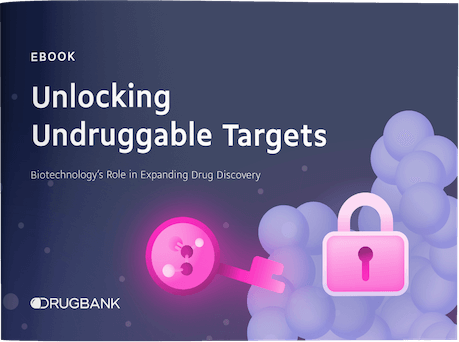Explore a selection of our essential drug information below, or:
Identification
- Generic Name
- Elafin
- DrugBank Accession Number
- DB05161
- Background
Elafin is a human protein that is produced naturally in the skin, lung and breast, protecting the respective tissue from destruction by the immune system. Elafin’s ability to block the activity of destructive enzymes that are involved in inflammatory reactions makes it a highly promising active compound for the treatment of inflammatory lung diseases or severe reperfusion injuries occurring after heart attacks, serious injuries and organ transplantation. The excellent tolerability of Elafin in human subjects was demonstrated in a Phase I clinical single dose escalating study.
- Type
- Small Molecule
- Groups
- Investigational
- Synonyms
- Not Available
Pharmacology
- Indication
Investigated for use/treatment in inflammatory disorders (unspecified).
 Reduce drug development failure ratesBuild, train, & validate machine-learning modelswith evidence-based and structured datasets.Build, train, & validate predictive machine-learning models with structured datasets.
Reduce drug development failure ratesBuild, train, & validate machine-learning modelswith evidence-based and structured datasets.Build, train, & validate predictive machine-learning models with structured datasets.- Contraindications & Blackbox Warnings
 Prevent Adverse Drug Events TodayTap into our Clinical API for life-saving information on contraindications & blackbox warnings, population restrictions, harmful risks, & more.Avoid life-threatening adverse drug events with our Clinical API
Prevent Adverse Drug Events TodayTap into our Clinical API for life-saving information on contraindications & blackbox warnings, population restrictions, harmful risks, & more.Avoid life-threatening adverse drug events with our Clinical API- Pharmacodynamics
Not Available
- Mechanism of action
Elafin is able to abrogate lipopolysaccharide-induced production of monocyte chemotactic protein 1 in monocytes by inhibiting AP-1 and NFkappaB activation. Due to its selective expression at mucosal surfaces as well as in alveolar macrophages, monocytes and neutrophils, the ability of Elafin to inhibit the lipopolysaccharide signaling pathway may be important in disease states such as cystic fibrosis, pneumonia, and acute respiratory distress syndrome. The inhibition of two key inflammatory pathways confirms the importance of Elafin as a mediator of the innate immune response.
Target Actions Organism UNeutrophil elastase Not Available Humans UMyeloblastin Not Available Humans - Absorption
Not Available
- Volume of distribution
Not Available
- Protein binding
Not Available
- Metabolism
- Not Available
- Route of elimination
Not Available
- Half-life
Not Available
- Clearance
Not Available
- Adverse Effects
 Improve decision support & research outcomesWith structured adverse effects data, including: blackbox warnings, adverse reactions, warning & precautions, & incidence rates. View sample adverse effects data in our new Data Library!Improve decision support & research outcomes with our structured adverse effects data.
Improve decision support & research outcomesWith structured adverse effects data, including: blackbox warnings, adverse reactions, warning & precautions, & incidence rates. View sample adverse effects data in our new Data Library!Improve decision support & research outcomes with our structured adverse effects data.- Toxicity
Not Available
- Pathways
- Not Available
- Pharmacogenomic Effects/ADRs
- Not Available
Interactions
- Drug Interactions
- This information should not be interpreted without the help of a healthcare provider. If you believe you are experiencing an interaction, contact a healthcare provider immediately. The absence of an interaction does not necessarily mean no interactions exist.Not Available
- Food Interactions
- Not Available
Categories
- Drug Categories
- Classification
- Not classified
- Affected organisms
- Not Available
Chemical Identifiers
- UNII
- Not Available
- CAS number
- Not Available
- InChI Key
- Not Available
- InChI
- Not Available
- IUPAC Name
- Not Available
- SMILES
- Not Available
References
Clinical Trials
- Clinical Trials
Clinical Trial & Rare Diseases Add-on Data Package
Explore 4,000+ rare diseases, orphan drugs & condition pairs, clinical trial why stopped data, & more. Preview package Phase Status Purpose Conditions Count Start Date Why Stopped 100+ additional columns Unlock 175K+ rows when you subscribe.View sample data1 Completed Treatment Pulmonary Arterial Hypertension (PAH) 1 somestatus stop reason just information to hide
Pharmacoeconomics
- Manufacturers
- Not Available
- Packagers
- Not Available
- Dosage Forms
- Not Available
- Prices
- Not Available
- Patents
- Not Available
Properties
- State
- Solid
- Experimental Properties
- Not Available
- Predicted Properties
- Not Available
- Predicted ADMET Features
- Not Available
Spectra
- Mass Spec (NIST)
- Not Available
- Spectra
- Not Available
- Chromatographic Properties
Collision Cross Sections (CCS)
Not Available
Targets

- Kind
- Protein
- Organism
- Humans
- Pharmacological action
- Unknown
- General Function
- Serine protease that modifies the functions of natural killer cells, monocytes and granulocytes. Inhibits C5a-dependent neutrophil enzyme release and chemotaxis (PubMed:15140022). Promotes cleavage of GSDMB, thereby inhibiting pyroptosis (PubMed:36899106). Capable of killing E.coli but not S.aureus in vitro; digests outer membrane protein A (ompA) in E.coli and K.pneumoniae (PubMed:10947984)
- Specific Function
- cytokine binding
- Gene Name
- ELANE
- Uniprot ID
- P08246
- Uniprot Name
- Neutrophil elastase
- Molecular Weight
- 28517.81 Da
- Kind
- Protein
- Organism
- Humans
- Pharmacological action
- Unknown
- General Function
- Serine protease that degrades elastin, fibronectin, laminin, vitronectin, and collagen types I, III, and IV (in vitro) (PubMed:2033050, PubMed:28240246, PubMed:3198760). By cleaving and activating receptor F2RL1/PAR-2, enhances endothelial cell barrier function and thus vascular integrity during neutrophil transendothelial migration (PubMed:23202369). May play a role in neutrophil transendothelial migration, probably when associated with CD177 (PubMed:22266279)
- Specific Function
- enzyme binding
- Gene Name
- PRTN3
- Uniprot ID
- P24158
- Uniprot Name
- Myeloblastin
- Molecular Weight
- 27806.815 Da
Enzymes
- Kind
- Protein
- Organism
- Humans
- Pharmacological action
- Unknown
- Actions
- Inhibitor
- General Function
- Part of the host defense system of polymorphonuclear leukocytes. It is responsible for microbicidal activity against a wide range of organisms. In the stimulated PMN, MPO catalyzes the production of hypohalous acids, primarily hypochlorous acid in physiologic situations, and other toxic intermediates that greatly enhance PMN microbicidal activity (PubMed:9922160). Mediates the proteolytic cleavage of alpha-1-microglobulin to form t-alpha-1-microglobulin, which potently inhibits oxidation of low-density lipoprotein particles and limits vascular damage (PubMed:25698971)
- Specific Function
- chromatin binding
- Gene Name
- MPO
- Uniprot ID
- P05164
- Uniprot Name
- Myeloperoxidase
- Molecular Weight
- 83867.71 Da
References
- Tiefenbacher CP, Ebert M, Niroomand F, Batkai S, Tillmanns H, Zimmermann R, Kubler W: Inhibition of elastase improves myocardial function after repetitive ischaemia and myocardial infarction in the rat heart. Pflugers Arch. 1997 Mar;433(5):563-70. [Article]
Drug created at October 21, 2007 22:23 / Updated at June 12, 2020 16:52


